Take a breath Vancouver Canucks fans, the team is finally rebuilding.
Even though Trevor Linden and Jim Benning were reluctant to toss out the dreaded “R” word, it’s clear that’s what the team is doing, especially after Benning’s recent interview with Bob McKenzie, although his moves at the trade deadline already signaled the shift. Trading Alex Burrows and Jannik Hansen for Jonathan Dahlen and Nikolay Goldobin created a buzz around Vancouver. The team now has one of the better prospect pools in the league, especially after a stellar draft.
Of course, when July 1st rolled around, Benning signed five veteran players, and recently added Thomas Vanek. Hiring a glut of veterans won’t appease those who want to see the youngsters get a chance.
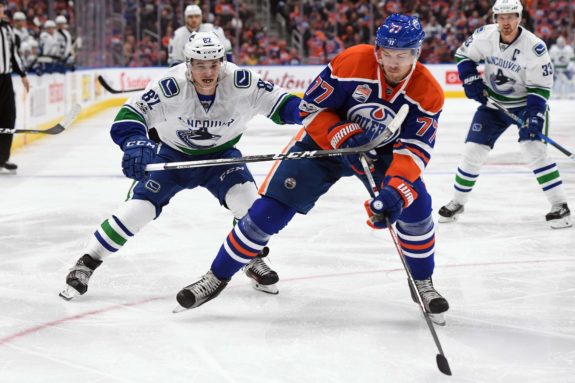
Patience is a word that comes to mind when thinking about the Canucks’ future. They have lots of good young players, but most of them aren’t ready to make the NHL jump. That’s why Benning made a handful of low-risk signings, which will create intense training camp battles.
There are loads of questions surrounding the team heading into the season. Is this the Sedins’ last year? Can Jacob Markstrom handle number one goaltending duties? Is Brock Boeser Calder-worthy? The team won’t make the playoffs unless everything falls into place, but there’s lots to be intrigued about.
2016-17 Record: 30-43-9, 69 Points (7th in Pacific Division, 13th in Western Conference, 29th in NHL Standings)
Offseason Moves

Key Roster Additions
- Sam Gagner
- Michael Del Zotto
- Thomas Vanek
- Alex Burmistrov
- Anders Nilsson
- Patrick Wiercioch
- Philip Holm
Key Roster Losses
- Ryan Miller
- Nikita Tryamkin
- Luca Sbisa
- Philip Larsen
2017 NHL Entry Draft
- Elias Pettersson (1st round, 5th overall)
- Kole Lind (2nd round, 33rd overall)
- Jonah Gadjovich (2nd round, 55th overall)
- Michael DiPietro (3rd round, 64th overall)
- Jack Rathbone (4th round, 95th overall)
- Kristoffer Gunnarsson (5th round, 135th overall)
- Petrus Palmu (6th round, 181st overall)
- Matt Brassard (7th round, 188th overall)
Organizational Changes
Willie Desjardins was predictably fired one day after the Canucks’ regular season ended. He has a great hockey mind, but his stubbornness was his downfall. That shouldn’t be a problem with new head coach Travis Green. During his press conference before training camp, Green said, “There hasn’t been a day where I haven’t thought about different line combinations.” He won’t hesitate to pull the plug on a line that’s not working out.
The Canucks didn’t wait long to hire Green after Desjardins was fired. They spent four years grooming him as Green coached the Utica Comets. In my recent chat with Utica Comets beat writer Ben Birnell, he noted Green’s adaptability during games. He mentioned that Thatcher Demko praised Green for bringing the Comets within striking distance of the playoffs despite a rash of injuries.
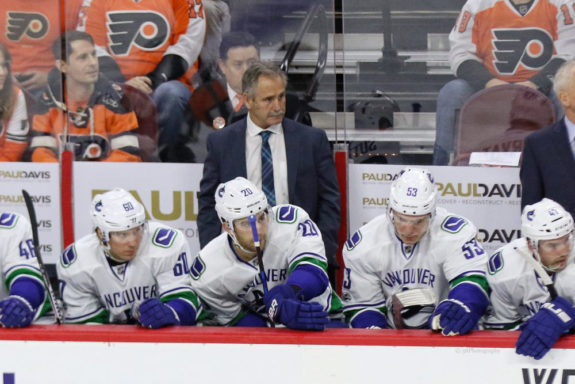
Green is a hybrid of both the Canucks’ last coaches. He’s not afraid to give tough love like John Tortorella, but he is also praised for working well with younger players like Desjardins. After garnering attention from around the league, he will finally get his NHL chance after signing a four-year contract. Judging by the Canucks’ iffy roster, he should have a long leash for turning the team back into a contender, but there must also be an improvement.
After assistant coaches Doug Lidster and Perry Pearn were fired, the Canucks replaced them with Nolan Baumgartner, Manny Malhotra, and Newell Brown. Baumgartner was Green’s right-hand-man in Utica, and he will run the defence. Malhotra earned a promotion after working in the organization last year. Brown returns to the Canucks, where he coached one of the league’s best power plays from 2010-13. Doug Jarvis is the lone assistant coach that remains from last year.
Forwards
Projected Lines
Daniel Sedin – Henrik Sedin – Markus Granlund
Sven Baertschi – Bo Horvat – Brock Boeser
Loui Eriksson – Alex Burmistrov – Thomas Vanek
Scottie Upshall (PTO) – Brandon Sutter – Sam Gagner
Extra: Derek Dorsett
*Injured: Brendan Gaunce (out until November)
Bo Horvat
Even before he signed his new contract, Horvat was the Canucks’ best player. His contract shows how far Horvat has risen during his three NHL seasons.
He’s defied the odds ever since being drafted ninth overall in 2013. Once labelled a slow skater with a second line ceiling, he is arguably a first line player already. That may reflect more on the Canucks’ roster, but there’s a good chance that we haven’t seen the best of Horvat yet.
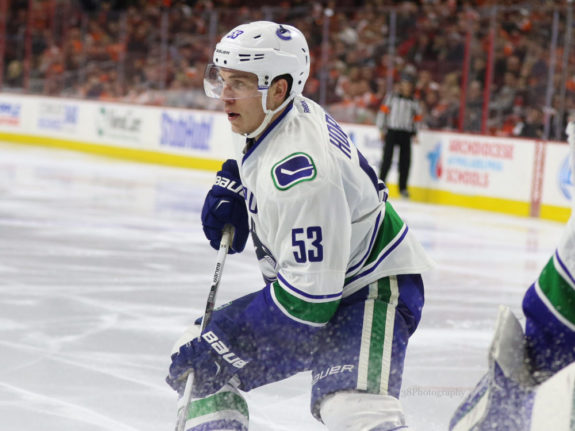
After putting up 20 goals and 52 points last season, look for Horvat to hit another gear this year. He should get more offensive opportunities under Green, something Desjardins shied away from. There’s also a good chance that Boeser ends up on his wing. Although the stint was short, Sven Baertschi, Horvat, and Boeser looked good together last season.
Horvat still needs to polish his game. Poor defensive play and penalty killing are his weaknesses. If he shores up those parts of his game, he could blossom into a dominant two-way centre with a goal-scoring touch.
Loui Eriksson
Last year, Loui Eriksson was the anti-thesis to Horvat. After signing the second-largest deal of the free agent market in 2016, Eriksson turned in a dud of a season. The Swedish winger regressed from 30 goals and 63 points to 11 goals and 24 points in his Canucks debut.
Eriksson was brought in to elevate the Sedins’ game for a couple more seasons until they rode off into the sunset. Now, he’s not even on the radar to start the season on their line.
It’s unlikely that he turns in another performance as horrid as last season. He probably isn’t the 30-goal, 60-point player that the Canucks signed either, but reaching 40 points is attainable. It’s worth noting that Eriksson might not get top ice time, as he projects to slide into the middle six of the Canucks lineup.
Sam Gagner
Sam Gagner was bound to cash in after his bounce-back season with the Columbus Blue Jackets. He parlayed his strong performance from 2016-17 into a three-year contract with the Canucks. The signing provides insulation for some of Vancouver’s youngsters before they’re ready to make the jump to the NHL.
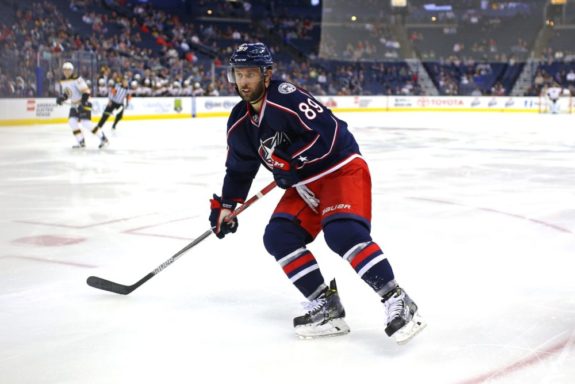
Which side of Gagner will we see this year? Is he the 50-point player from Columbus or the fringe-NHLer that showed up for Philadelphia Flyers. The answer probably lies somewhere in the middle.
Gagner was a consistent 40-point player while he was in Edmonton, although those numbers came while playing in the top-six. Gagner is unlikely to see those minutes in Vancouver, so look for him to contribute in a bottom-six, power play role. Fifty points is a stretch considering he played with more talent in Columbus. There’s no Zach Werenski in Vancouver. He also isn’t guaranteed power play time with Vanek, Boeser and others in the mix. Expecting 30 points out of Gagner is a reasonable and realistic target.
Defence
Projected Pairings
Alex Edler – Troy Stecher
Ben Hutton – Chris Tanev
Michael Del Zotto – Erik Gudbranson
Extra: Patrick Wiercioch, Alex Biega
Troy Stecher
Troy Stecher was a beacon of light during a season of darkness for the Canucks. Despite his stature, Stecher used his NHL-ready intelligence and stick work to battle his way onto the Canucks’ roster. His early play sent the city into Stechermania, which hit pandemonium levels once he scored his first NHL goal against the Dallas Stars.
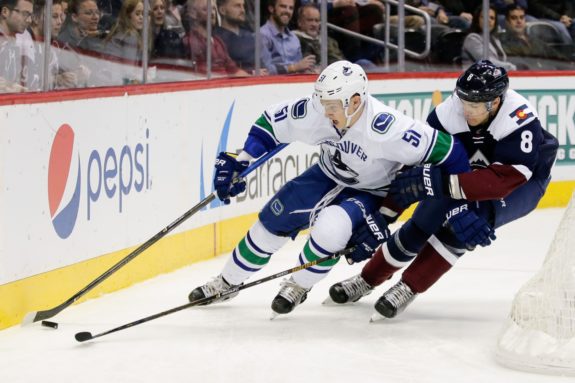
By the end of the season, the fans voted Stecher as the team’s best defenceman. The Richmond, B.C. native found a home on the top pairing beside Alex Edler, playing 71 games and posting 24 points.
Will Stecher be able to avoid a sophomore slump? It hit Ben Hutton pretty hard last year, as both his defensive play and even-strength play slipped. Stecher seems to have a higher hockey IQ than Hutton, which might help him avoid regression. The 23-year-old will be relied upon to play big minutes this season.
Chris Tanev
Once the 2016-17 season wrapped up, airwaves in Vancouver were bombarded with “Trade Tanev” talk. After an offseason full of changes, Tanev remains on the blue line. Shopping him made sense, but the team is probably happy to have their number one defenceman back in the mix.
On a team that looks poised to give up a ton of goals, Tanev is a rock. He possesses uncanny intelligence in his own end, and his underrated work on the boards allows him to get the puck up the ice effectively. Tanev also makes players around him better. He even made Luca Sbisa look capable of playing defence.
As always, the main concern with Tanev is injuries. In his five full NHL seasons, he’s always battled injuries. Last year was no different, as injuries limited him to 53 games. If he stays healthy, he’s a player to watch. At 27-years-old one of the best defensive defenders in the game is about to hit his prime.
Michael Del Zotto
The new kid on the blue line is taking what could be his last shot at an NHL revival. Del Zotto came into the league with the New York Rangers and flashed some tantalizing offensive skills early on in his career. He posted 37 and 41 points in his rookie and third NHL season respectively. His play dipped during his fourth and fifth NHL seasons, leading to a trade to the Nashville Predators, but he lasted only 25 games with the Preds.
After falling out of favour in New York and Nashville, Del Zotto signed with the Philadelphia Flyers. In his first season, he showed flashes of the “old” Del Zotto,” scoring ten goals and adding 32 points in 64 games. However, he was surpassed on the depth chart by other players such as Shayne Gostisbehere and Ivan Provorov over his next two seasons.
He now comes to Vancouver with a mixed bag of results. Is he the playmaking offensive defenceman that he can be or the unreliable player who isn’t overly stout on defense? The experience he brings could be valuable for the Canucks, especially for a player like Hutton.
Goaltending
Goaltending has to be the biggest question mark of all the uncertainties surrounding the Canucks. Ryan Miller predictably departed on July 1st, moving closer to his wife by taking a deal with the Anaheim Ducks. It left Jacob Markstrom as the presumed number one goalie.

The Canucks still needed a backup, so on July 1st, they signed another 27-year-old, 6’6″, Swedish goalie in Anders Nilsson. His contract, at two years, $5 million, suggests that he might be more than just a backup. Nilsson performed admirably last season in front of a porous Sabres defense. His .923 save percentage was tied for 10th in the NHL with Matt Murray, Devan Dubnyk and Carey Price, impressive company.
Markstrom is presumably the starting goalie entering the season if Green doesn’t start with a time split right away. It’s worth noting that Green largely used a time split with his goalies while coaching in Utica, even when Markstrom played in the AHL.
The Canucks will go into the season with the third-least experienced goaltending tandem in the league. Markstrom and Nilsson have a combined 185 games, which is ahead of only the San Jose Sharks and Arizona Coyotes. Both of these guys have a huge opportunity to showcase their skills as a number one NHL goaltender. If both of them falter, the Canucks are assuredly bound for the league’s basement.
Breakout Player: Brock Boeser
Last year in this category I picked Sven Baertschi. While he modestly improved on his goal and point totals, it wasn’t a breakout as much as it was a player steadily progressing. I feel more confident in predicting that Boeser will be the Canucks’ breakout player this year. There is a ton of hype surrounding the Canucks’ blue-chip prospect, so much so that Boeser is hearing his name in Calder Trophy talk already.
His Canucks debut started with a bang, as he scored in his first game playing in front of friends and family. While the Canucks limped to the finish line, Boeser stood out. He ended up with four goals and five points in nine games.
What a release. @BBoeser16 ???? pic.twitter.com/zkpQy4NyV9
— Vancouver #Canucks (@Canucks) September 16, 2017
It wasn’t that long ago that another Canucks youngster scored five goals in his first nine games. That same player has only scored five goals in his last 89 NHL games.
Boeser stood out last year while playing against NHL competition, and he looks miles ahead of the other Canucks prospects early this preseason. It’s always hard to tell how a college rookie will fare during a full 82-game season, but Boeser has as good a shot as any rookie to succeed. He’s already one of the most skilled players on the Canucks, and he’s responsible enough defensively to hold his own at this level. Believe it, because the Boeser hype is real.
Player With Most to Prove: Jacob Markstrom
An honourary mention goes to Loui Eriksson, but it’s unlikely he’ll live up to his contract. Instead, the player with the most to prove is Markstrom.
Having never been a starter in the league, the Canucks should get a chance to find out what they really have in Markstrom. Under Desjardins over the last two years, there was pressure to play Markstrom in more games. The coach didn’t flinch and rode Miller when games were on the line. To date, Markstrom has never played more than 32 games in a full season. In fairness, the 2015-16 season when he played 32 games was his best statistical season to date.
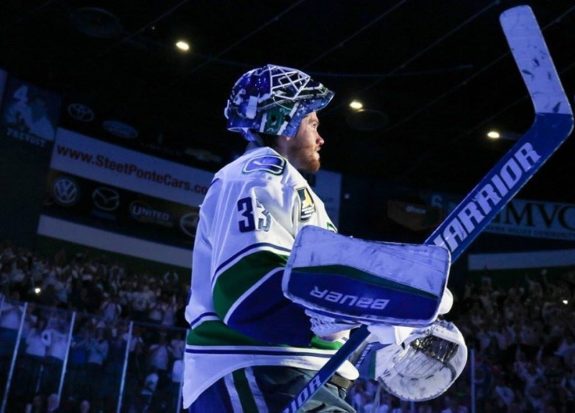
Markstrom started out his career as a highly touted prospect, but poor performances in front of a leaky Florida Panthers defence hurt his stock. He did hone his game in the AHL under Green and has shown flashes of brilliance at the NHL level. He does have his weaknesses though, which include his glove hand and his mental fortitude. Markstrom has shown obvious frustration during games and after losses when he is struggling. He will have to adapt quickly in front of a team that allowed the third-most goals last season.
No one has any idea if Markstrom can handle the starting load. This should be the season where we finally find out. Hopefully, he’ll at least record a shutout.
First Players in Line for a Call-Up
Forwards
Last year I wrote, the Canucks didn’t have a wealth of forward options on the farm. This season, Benning stocked the cupboard.
There are five roster players on the bubble of making the team that I don’t have in my predictions. Three are offensively-minded forwards that have been lost in the roster shuffle. The signings of Vanek and Gagner have pushed Nikolay Goldobin, Reid Boucher, and Anton Rodin down the depth chart. Boucher and Rodin require waivers, but Goldobin does not. That’s not bad news for the Comets, who should have more offensive muscle than last year.
One notable omission I have on my projected lineup is Jake Virtanen. Of all the players listed here, he has the best shot at making the Canucks’ opening night roster. Even after a season where he only had 19 points in 65 AHL games, he can muscle his way onto the roster.
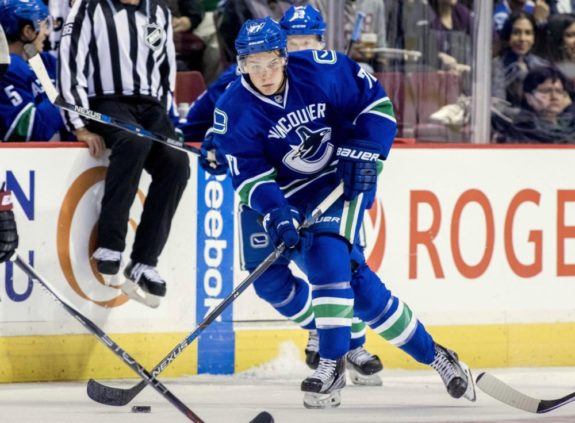
Green admitted that Virtanen was snake-bitten offensively last season, but he improved during the year. The Canucks again lack muscle, and Virtanen brings that in spades. He’s also responsible defensively, something he showed as a 19-year-old rookie in the NHL. With a stellar preseason, don’t be surprised if he makes the lineup. If he doesn’t, he’s one good performance in Utica away from a recall.
Another intriguing option is Jonathan Dahlen. It looks like he will stay in North America as opposed to going back to Europe. That means he will play in Utica as he adjusts to the North American game. While he’s a long shot to earn a call-up, an impressive AHL performance may tempt the Canucks to see what he can offer at the NHL level.
All of the five options above are wingers, so Michael Chaput is most likely to earn a call if they are looking for a centre. However, both Gagner and Granlund are natural centres, which hurts Chaput’s chances.
Notice how Jayson Megna isn’t even one of the top-six call-up options? Funny how that works.
Defence
There are some tight battles for the seventh and eighth spots on defence in Vancouver. With the top-six pretty much set, expect veterans Patrick Wiercioch and Alex Biega to hold down the last two spots. The younger defenders will continue to hone their game in the AHL.
Three of Utica’s top-six on defence remain in the mix for a roster spot, but they are all long shots. Jordan Subban is the most prominent of the bunch, but Green didn’t have glowing praise for him during training camp. While his offensive skills are dynamic, he still needs to work on winning one-on-one battles.

Andrey Pedan had a rough season in Utica last year. He saw a dramatic dip in points, going from 21 in 45 games during 2015-16, to 10 points in 52 games last season. He was also a healthy scratch at times. The 24-year-old does have the size and mobility that the Canucks are looking for, but he’s yet to put his game together.
Evan McEneny has passed Pedan on the depth chart after an impressive AHL campaign. It was his first pro season with a clean bill of health, and McEneny exceeded everyone’s expectations. The AHL rookie ended as the Comets’ all-around best defenceman. He provided a steady defensive presence with some offence, and he earned a call-up to the Canucks in February.
The player who has the closest chance of making the Canucks out of camp is Philip Holm. Of the defencemen on the call-up list, the 25-year-old from the Swedish Elite League is arguably the most NHL-ready. He played a whopping 26 minutes during the Canucks’ second preseason game against Vegas, with most of the veterans in China. Holm has the best chance of beating out Wiercioch or Biega for one of those final spots.
Season Outlook
There are arguably six NHL teams that have next-to-no chance of making the playoffs. Those teams would include the New Jersey Devils, Detroit Red Wings, Arizona Coyotes, Colorado Avalanche, Vegas Golden Knights and the Canucks. Five of these six teams, excluding the Avalanche, are tied with the worst overall odds (200/1) of winning the Stanley Cup.
Still, there’s that ever-so-slim chance that, if enough goes right, the Canucks could make the playoffs. It would be a shock, but it’s not impossible. If young players like Horvat, Baertschi, Boeser, and Granlund improve, they will help move the sticks offensively. Daniel Sedin should bounce back from posting a career-low 6.9 shooting percentage, and Eriksson is bound to get more than 24 points. Gagner and Vanek would have been third and fourth on the Canucks in scoring last season respectively.
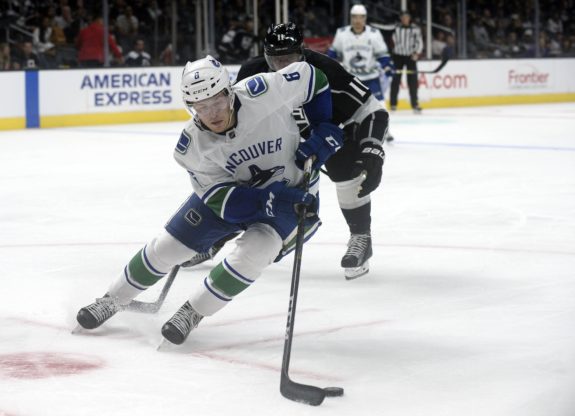
The defence has some interesting players, and they could be a good unit if they gel. However, there’s also the possibility that Hutton doesn’t bounce back, Stecher endures a sophomore slump, and Del Zotto and Gudbranson don’t work out. Some of those players will likely improve upon last season’s performance, but betting on all of them is risky.
The Canucks goaltending is a question mark, but it could also become a strength. Both goalies have shown flashes of brilliance, and a healthy competition could be good for the Canucks’ crease. Their success will depend on the defence.
Even if this season goes predictably sideways, there’s a stellar 2018 draft class waiting for the Canucks. Rasmus Dahlin, Andrei Svechnikov and Adam Boqvist look like game-changers, and the top ten are promising.
You know expectations are low when you start looking at prospects of next year’s draft class before the season even begins, but such is life in Vancouver. Green should have a positive impact on the team, and improved depth should result in a few more wins, a few more goals, and a few more goals against. Progression from the young players and a high draft pick would be successes for the Canucks, but don’t bank on them making a dramatic climb up the standings. At least not this season.
2017-18 Record Prediction: 34-38-10, 78 Points (7th in Pacific Division, 13th in Western Conference, 27th in NHL)